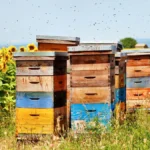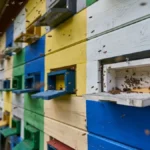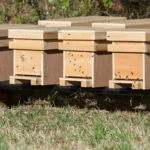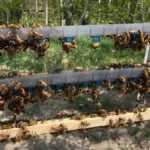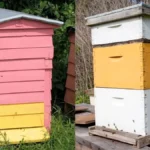Matt Reed bravely entered his bee products company in the reality TV show, Shark Tank, attempting to secure funding for the expansion of his business “Bee Thinking”. I can resonate and understand this business process having built a similar business myself once upon a time. Before reality TV was there to film our every mistake and success. Let us have a look at how the innovative ideas that Matt pioneered evolved and transferred to Bee Built, a company with a similar objective.
The Shark Tank Beehive
Matt Reed pitched his business idea on the Shark Tank, a reality parody of the venture capital world. Having pitched many ideas to many venture capitalists over the years, and having watched The Shark Tank, I can safely say that, as with most “Reality” TV, this show portrays a version of Capital that is largely devoid of reality.
Why Beekeeping and Pure Capitalism Are Opposed
You can present the best business plan for anything to do with beekeeping – from making beehives to making funny new modern beehives, to innovative beekeeping in urban areas concept to a serious investor. They will not invest. Beekeeping is a lifestyle choice with small profit margins – beekeepers keep bees because it is a way of life, and they make a small profit. You will make more money putting your money in the bank than by keeping bees – but you will have a lot more fun making money by keeping bees.
I remember chatting to a wise old beekeeper and he explained to me that if you want to become a millionaire out of beekeeping it is best to start off as a billionaire. He also told me that the process would be great fun!
Bee Thinking Shark Tank Episode
I did not actually see this episode. I have watched a few episodes of Shark Tank, and I commend the idea behind the show. However, as I said earlier, it is so devoid of the reality of the real VC world that it gives us a very skewed idea of how the early-stage capital system works.
We definitely need to encourage people to start businesses. Much like encouraging women to base their marriage goals on Disney cartoons and princes in shining armor, basing your understanding of starting a business on the Shark Tank is doomed to failure/divorce. This is a romanticized version of capital crafted for people with ADD who take a lot of Ritalin.
Matt Reed presented an excellent business opportunity on Shark Tank. It was excellent because it had triple bottom line principles. Beekeeping development, environmental sustainability, and profit. The model was to provide equipment to urban beekeepers who would rehabilitate the urban environment through beekeeping. The model is brilliant and the product offering was good. High-quality boutique beekeeping equipment aimed at the hobbyist urban beekeeper. The Return on Investment however was probably not what a Shark Investor would be looking for.
Beethinking Hives
From what I can understand, Beethinking operated as a business for a while and now redirects to www.beebuilt.com. Beebuilt has a lovely selection of products that are suited to the hobbyist or urban beekeeper. Let’s unpack this.
Commercial Beekeeping vs Hobbyist Beekeeping
Commercial beekeepers typically run very large numbers of beehives attempting to achieve the economies of scale needed to make profits. Commercial beekeepers consequently source equipment that is rugged, cost-effective, and more often than not – aesthetically lacking.

Hobbyist beekeepers do not depend on beekeeping for income. Beekeeping is a form of meditation, relaxation, recreation and is a lifestyle choice. As a hobbyist beekeeper, there are people who make homemade beehives that look like they were hit by a tornado (me when I started). There are hobbyist beekeepers who make incredible hives. And there are suppliers who make beautiful beehives. Beebuilt is such a supplier.
Timber
I ran a sawmill and workshop making beehives for many years. Timber is the foundation of a good or a bad beehive. The hives I can see on Beebuilt are made from sustainably forested Douglass Fir or Western Red Ceder. These are excellent timber choices, and if suitably finished, look beautiful in a backyard.
As a person who has worked in the timber industry, I look at wood and look for eyes/knots. You will see that these hives are made from clear timber – free of eyes. This ensures long-lasting hive quality.
Joints
Having run a sawmill and worked in the legal cannabis industry I have an appreciation of high-quality joints. You will see that all of these hives feature precision cut joints. A good joint should be a tight joint. This is particularly important for controlling the small hive beetle. Hive beetles will find any small crack in a hive and lurk there. Good joints keep beetles out.
Reading all of this you may be tempted to look at making beehives. Let us have a look a that.
Starting A Beehive Business
I have been in the business of making beehives. It is a pain. If you enjoy this sort of thing you can probably make a living, but my observation is there are a lot of players in the market. New CNC machinery is becoming less and less expensive, and large well-capitalized operators can produce beekeeping equipment of a quality we have never seen before.
New materials are entering the market, and composite and plastic beehives are also now available. We definitely need as many beekeepers and beehives in the world as are possible. However, when a market develops and too many manufacturers enter that market we end up with market dynamics that do not benefit the industry. My observation is that the beekeeping equipment supply market is oversupplied. And that is probably why the Shark Tank investors did not invest in the Bee Thinking opportunity.
I hope this has answered your questions about “The shark tank beehive”. As we move into a new world system where environmental and life quality choices are more carefully considered, I hope that we will see the Venture Capital markets taking more time to evaluate triple bottom line opportunities. If you enjoyed this please share.
The Beethinking Hive FAQs
What was Matt Reed’s business pitch on Shark Tank about?
Matt Reed pitched his company “Bee Thinking,” focusing on sustainable beekeeping products for hobbyist beekeepers, combining environmental and business goals.
Also read: How to Use a Beekeeping Smoker: 5 Essential Tips
Why didn’t the Shark Tank investors fund Bee Thinking?
The Sharks were hesitant because beekeeping, while environmentally sustainable, offers smaller profit margins, which may not align with typical high-return investor expectations.
How does beekeeping clash with capitalism?
Beekeeping is more of a lifestyle choice than a high-profit industry. Investors may avoid it because the financial returns are modest compared to other ventures.
What happened to Bee Thinking after Shark Tank?
Bee Thinking eventually redirected to Bee Built, a company that continues to offer high-quality beekeeping products aimed at hobbyist and urban beekeepers.
What type of beehives does Bee Built sell?
Bee Built sells premium beehives made from sustainably harvested Douglas Fir and Western Red Cedar, designed for hobbyist and urban beekeepers.
Are the joints in Bee Built hives important?
Yes, Bee Built’s hives feature precision-cut joints, which are crucial for keeping pests like the small hive beetle out and ensuring the durability of the hive.
Is starting a beehive business profitable?
Starting a beehive business can be challenging due to market saturation and competition from larger companies with advanced CNC machinery and composite materials.
What materials are used for beehives today?
In addition to traditional wood, composite and plastic materials are now used for beehives, providing more options for beekeepers with different needs.
What’s the difference between commercial and hobbyist beekeeping?
Commercial beekeepers focus on large-scale production for profit, while hobbyists engage in beekeeping as a form of recreation, meditation, and environmental contribution.
Can beekeeping be a successful business in urban areas?
Yes, urban beekeeping is growing, and companies like Bee Built cater to hobbyists who wish to help rehabilitate urban environments through sustainable beekeeping practices.

Dr. Garth A. Cambray is a Canadian/South African entrepreneur and beekeeper with 28 years of experience in apiculture and specializes in adding value to honey. His Ph.D. research developed a new advanced continuous fermentation method for making mead that has resulted in a number of companies globally being able to access markets for mead. His company, Makana Meadery, exports honey mead to the USA where it is available to discerning connoisseurs. He has also developed technologies to commercially manufacture organic honey vinegar in Zambia for export globally. He holds a few patents globally in the ethanol industry and believes in technology and knowledge transfer for human development and environmental sustainability. One of his proudest achievements is the fact that the wind farm he started at one of his old apiary sites has essentially made his hometown carbon neutral.


